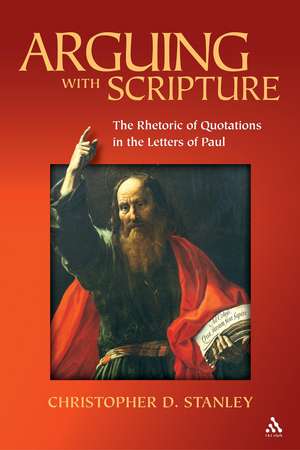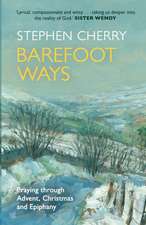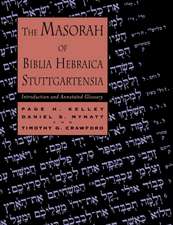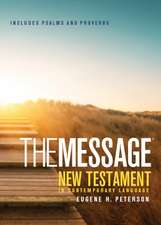Arguing With Scripture: The Rhetoric of Quotations in the Letters of Paul
Autor Professor Emeritus Christopher D. Stanleyen Limba Engleză Paperback – 31 aug 2004
Preț: 373.82 lei
Preț vechi: 517.42 lei
-28% Nou
Puncte Express: 561
Preț estimativ în valută:
71.55€ • 77.75$ • 60.14£
71.55€ • 77.75$ • 60.14£
Carte tipărită la comandă
Livrare economică 21 aprilie-05 mai
Preluare comenzi: 021 569.72.76
Specificații
ISBN-13: 9780567026309
ISBN-10: 0567026302
Pagini: 208
Dimensiuni: 161 x 231 x 13 mm
Greutate: 0.34 kg
Editura: Bloomsbury Publishing
Colecția T&T Clark
Locul publicării:New York, United States
ISBN-10: 0567026302
Pagini: 208
Dimensiuni: 161 x 231 x 13 mm
Greutate: 0.34 kg
Editura: Bloomsbury Publishing
Colecția T&T Clark
Locul publicării:New York, United States
Recenzii
"This unique study provides the first full-length study of the impact that Paul's quotations had upon his audience.... It is a fresh approach to the analysis of Paul's use of scripture.... This emphasis on authority and quotation then becomes a key ingredient in Stanley's examination of Paul's Scripture quotations.... His points provide a good critique of many studies on Paul's use of Scripture.... There are a number of strengths to Stanley's study. He has provided a much needed vantage point for looking at Paul's quotations of Scripture and emphasized the audience's reaction to Scripture quotations rather than the author's use. He has also focused attention on the diverse Scripture literacy of Paul's audience. These points deserve to be considered further in Paul's use of Scripture.... Arguing with Scripture does open up much room for understanding Paul's use of Scripture. His audience-centered approach will provide a fruitful starting point for many further investigations of Paul, his readers, and the role of Scripture." -RBL (Society of Biblical Literature), 1/05
Review ~ International Review of Biblical Studies, vol 51,2004/05
"In our opinion, Stanley's treatment of Paul's quotations is not penetrating either in content or rhetorical analysis. As a result he can present a view of Paul's quotation process that is at odds with the organic nature of revelation and the progressive movement of redemptive history. Perhaps others can find some usefulness in this work in spite of these flaws, but we have found little. Save your money and look up the quotations yourself. And if you want rhetorical insights, read Paul along with some classical rhetorical handbooks and Greco-Roman speeches. That would even help your preaching, but this book will not." - Scott F. Sanborn, Kerux: The Journal of Northwest Theological Seminary, September 2008
"Arguing with Scripture" is a theoretically sophisticated, methodologically innovative, exegetically sound, thorough and balanced study of how the Apostle Paul used scripture to argue with opponents and to persuade members of early Christian churches. By positing different hypothetical audiences for Paul's letters, at varying levels of familiarity with Jewish scripture, Stanley moves the debate about Paul's interpretive practices in new and more fruitful directions, away from concentrating exclusively on Paul's "intentions" and toward the variety of interpretations that are possible given a variety of possible kinds of audiences. Cognizant of the views of others and in dialogue with recent scholarship, Stanley judiciously demonstrates the remarkable freedom Paul used in quoting and interpreting scripture, but this study also shows just how persuasive--and sometimes unpersuasive--Paul's rhetoric may have been in the ancient church. Stanley's own arguments are persuasive indeed."--Dale B. Martin, Professor of Religious Studies, Yale University
"Christopher Stanley has provided an insightful analysis of Paul's enigmatic use of Scripture. Why did Paul seldom explicitly quote the Old Testament? Why did he use Scripture infrequently to support his deeper theological arguments? Stanley finds the answers to these and other questions in Paul's sensitivity to his rhetorical situations and the argumentation that he tailored for each. Stanley merges the study of Paul's use of Scripture and rhetorical analysis to create a helpful, custom-made tool for interpreting the Pauline Epistles."--Duane Watson, Professor of New Testament Studies, Malone College, Canton, Ohio
"While not everyone will agree with all of Chris Stanley's own arguments with Paul concerning his use and abuse of scriptural quotations, Arguing with Scripture represents a quantum leap forward in the study of this dimension of Paul's intertextuality. Stanley's highly productive combination of reader response and rhetorical criticism keeps the focus on a range of effects that Paul's strategic 'rhetoric of quotations' could have had on readers/auditors of varying competencies. While previous studies occasionally touch on these issues, Stanley foregrounds them and uses them to present many fresh insights. Indeed, he succeeds in problematizing no less than nine traditional scholarly assumptions about how Paul and his readers interacted with the biblical text! This is an important scholarly contribution that is clear, concise, and reader-friendly even to non-specialists. It deserves to be read by readers of all competencies.--Mark D. Given, Associate Professor of Religious Studies, Southwest Missouri State University, Springfield Missouri
"...Stanley's book is engaging and provocative. The questions that he raises are both poignant and important."- David Lincicum, June 2006/ Vol. 49 no.2
'[A] new methodological approach which promises to offer new insights into Paul's use of Scripture...This accesible study offers the reader a tremendous amount of insight into first century Christianity, pexposing some of the fallacies that are often assumed about Paul's audiences...This book is a fresh approach to Paul's use of Scriptures that has much to offer...and will certainly be of benefit whatever side of the Maximalist/Minimalist divide one resides.' Bryan D. Lee, Themelios, Vol 32, Issue 2, January 2006
Review ~ International Review of Biblical Studies, vol 51,2004/05
"In our opinion, Stanley's treatment of Paul's quotations is not penetrating either in content or rhetorical analysis. As a result he can present a view of Paul's quotation process that is at odds with the organic nature of revelation and the progressive movement of redemptive history. Perhaps others can find some usefulness in this work in spite of these flaws, but we have found little. Save your money and look up the quotations yourself. And if you want rhetorical insights, read Paul along with some classical rhetorical handbooks and Greco-Roman speeches. That would even help your preaching, but this book will not." - Scott F. Sanborn, Kerux: The Journal of Northwest Theological Seminary, September 2008
"Arguing with Scripture" is a theoretically sophisticated, methodologically innovative, exegetically sound, thorough and balanced study of how the Apostle Paul used scripture to argue with opponents and to persuade members of early Christian churches. By positing different hypothetical audiences for Paul's letters, at varying levels of familiarity with Jewish scripture, Stanley moves the debate about Paul's interpretive practices in new and more fruitful directions, away from concentrating exclusively on Paul's "intentions" and toward the variety of interpretations that are possible given a variety of possible kinds of audiences. Cognizant of the views of others and in dialogue with recent scholarship, Stanley judiciously demonstrates the remarkable freedom Paul used in quoting and interpreting scripture, but this study also shows just how persuasive--and sometimes unpersuasive--Paul's rhetoric may have been in the ancient church. Stanley's own arguments are persuasive indeed."--Dale B. Martin, Professor of Religious Studies, Yale University
"Christopher Stanley has provided an insightful analysis of Paul's enigmatic use of Scripture. Why did Paul seldom explicitly quote the Old Testament? Why did he use Scripture infrequently to support his deeper theological arguments? Stanley finds the answers to these and other questions in Paul's sensitivity to his rhetorical situations and the argumentation that he tailored for each. Stanley merges the study of Paul's use of Scripture and rhetorical analysis to create a helpful, custom-made tool for interpreting the Pauline Epistles."--Duane Watson, Professor of New Testament Studies, Malone College, Canton, Ohio
"While not everyone will agree with all of Chris Stanley's own arguments with Paul concerning his use and abuse of scriptural quotations, Arguing with Scripture represents a quantum leap forward in the study of this dimension of Paul's intertextuality. Stanley's highly productive combination of reader response and rhetorical criticism keeps the focus on a range of effects that Paul's strategic 'rhetoric of quotations' could have had on readers/auditors of varying competencies. While previous studies occasionally touch on these issues, Stanley foregrounds them and uses them to present many fresh insights. Indeed, he succeeds in problematizing no less than nine traditional scholarly assumptions about how Paul and his readers interacted with the biblical text! This is an important scholarly contribution that is clear, concise, and reader-friendly even to non-specialists. It deserves to be read by readers of all competencies.--Mark D. Given, Associate Professor of Religious Studies, Southwest Missouri State University, Springfield Missouri
"...Stanley's book is engaging and provocative. The questions that he raises are both poignant and important."- David Lincicum, June 2006/ Vol. 49 no.2
'[A] new methodological approach which promises to offer new insights into Paul's use of Scripture...This accesible study offers the reader a tremendous amount of insight into first century Christianity, pexposing some of the fallacies that are often assumed about Paul's audiences...This book is a fresh approach to Paul's use of Scriptures that has much to offer...and will certainly be of benefit whatever side of the Maximalist/Minimalist divide one resides.' Bryan D. Lee, Themelios, Vol 32, Issue 2, January 2006











